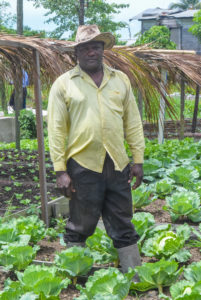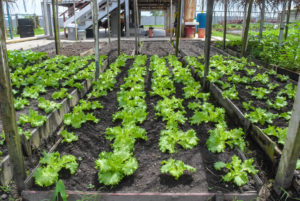
By Lakhram Bhagirat
The agriculture sector is dubbed as one of the most important sectors in any economy, given its ability to provide nourishment to us humans, yet the struggles of farmers are quite often downplayed. This is because many of us do not see the farmer rising before the crack of dawn or fighting to ensure that the crops are well-irrigated or even coming up with the right methods to eradicate pests and maximise yields.
Since ancient times, humans have been planting and rearing what they eat and to date, this is a necessity in order to ensure our survival. Guyana has bountiful and fertile lands, and many people are taking advantage of that. One of those persons is 46-year-old Roger Carryl.
Carryl grew up in a farming household in the village of Stanleytown, West Bank Demerara (WBD). Sugar cane is traditionally cultivated in the area, since the Wales Estate is located nearby. He remembers growing up in the village and going into the cane fields with his parents as they tend to the cane during the beginning and end of crops. He remembers playing in the trenches and ever so often, striking a few fishes. Those are the memories of his childhood and he holds them dear. When Carryl grew up, he decided that he too wanted to become a farmer and he began planting sugar cane at La Retraite, WBD. As the years went by, he acquired 25 acres of land and continued planting, taking his cane to the Wales Estate to be processed into sugar.
With the earnings from his sugar cane farm, Carryl was able to start his family and build a house where he now lives with his wife and four children.
 “Growing up we had some cattle and so on, and you could develop yourself. From the cane money you could build a house and so, and that is what I do. But ever since they closed down Wales, things become really bad because we nah got no plan in place,” he said.
“Growing up we had some cattle and so on, and you could develop yourself. From the cane money you could build a house and so, and that is what I do. But ever since they closed down Wales, things become really bad because we nah got no plan in place,” he said.
For Carryl, cash crop farming was the next avenue that was guaranteed to provide an income for him. He said he was literally forced by the circumstances to enter the cash crop arena because of the extreme lengths he had to go to, to ensure that his sugar cane reached the Uitvlugt Estate.
He explains that to transport one ton of cane from his farm to Uitvlugt cost $3000 and he would have to pay the harvester $2000 per ton. It requires 16 tonnes of cane to produce one ton of sugar for which he would be paid about $67,000. When added up, the expenses far outweighed the earnings, making sugar cane farming not feasible for him anymore.
“Before them man close the estate, the Government never come and sit down with we and let we get the dialogue on the way forward. Until now them never had a meeting with we farmers and we suffering here, but we got to survive and that is why plenty of them man ah convert them crop,” Carryl said.
He said that he only recently began converting his sugar cane farm into a cash crop farm, but could only afford to do five acres to date. He would have expended over $2 million for the conversion, which included purchasing new equipment and preparing his land.
“I had to grade down the land and plough and chip the place. I had to get mould and then buss the dam and put pipe to drain the land properly. All now I want to get a bulldozer and bulldoze the rest of the cane and plant rice, but money nah deh, bai. Nobody nah even come and say let we help you or this is how you can do it. NARI [National Agricultural Research & Extension Institute] people and them just don’t care and then them ah talk about green economy and grow you food.”
Apart from the lack of financial and technical assistance, Carryl said that they have to deal with animals damaging crops as well as the human factor. He explained that since he plants in the backdam persons would usually raid the farm in the night resulting in major losses and damage to the crops.
“To build a lil house there now is too much money. When was cane you didn’t have no problem. When you plant the cash crop, people thief it and then it also got the weather and so on. It hard to take care of the cash crop in this weather too,” he added.
Carryl plants lettuce, tomatoes, cabbage, celery, parsley, pepper, ochro, bora, and plantains in his former sugar cane fields. He has also converted the yard space at his home into a farm as well. He said that he enjoys farming and wishes people would appreciate the efforts of farmers, since they are the ones responsible for all the food. (Photos by Adam Baksh) (Sunday Times Magazine)



